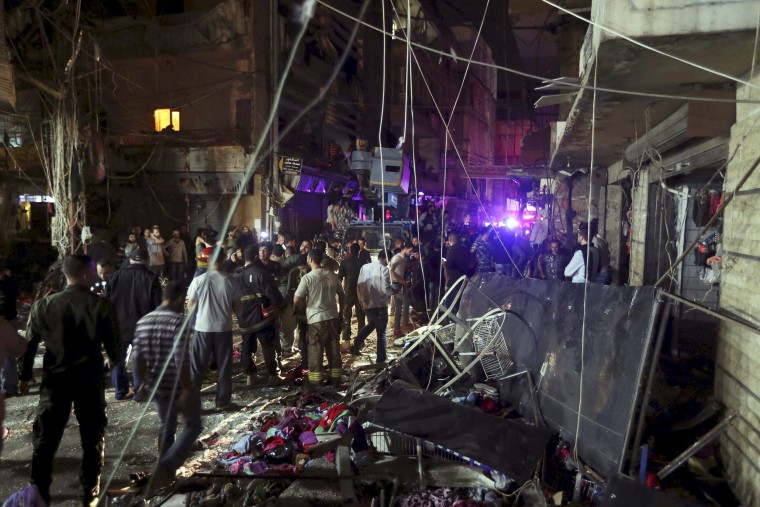Two explosions in a busy area of Beirut's southern suburb killed at least 43 people and wounded 239 more, the Lebanese Red Cross told NBC News, as ISIS claimed responsibility for the bloodshed.
The Syria and Iraq-based terror group said on social media that it orchestrated the dual attacks, which occurred just outside a Shi'ite center in the Borj al-Barajneh area, a stronghold of Lebanese Hezbollah.
ISIS said an explosives-laden motorcycle was detonated first, followed by a suicide bomber who was wearing a vest of explosives, according to global security firm Flashpoint Intelligence.
U.S. officials did not immediately respond to ISIS’s claims.

The attacks would appear to be the first ISIS suicide bombing in Lebanon, raising concerns that the extremists are expanding their grip in the volatile region.
In addition, Lebanon's Interior Minister Nouhad Machnouk said a third suicide bomber had been killed by one of the first two explosions before he could detonate his own bomb. His body was found nearby.
The bombs struck as Lebanese lawmakers held a legislative session for the first time in over a year. An ongoing political crisis has left the country without a president for 17 months, with the government failing to take even basic decisions such as garbage disposal.
Religious leaders warned last year that in the absence of a head of state, sectarian strife was threatening a country that was gripped by its own civil war from 1975 to 1990.
The bombings were the first attacks in more than a year in an area supportive of the Iran-backed movement, which has sent members to Syria to fight alongside President Bashar Assad's forces in the country's civil war.
Several bomb blasts struck Lebanon in June last year, in a spillover of violence linked to Syria.
The war in Lebanon's larger neighbor, with which it shares a border of more than 190 miles, has ignited sectarian strife in the multi-confessional country, leading to bombings and fighting between supporters of the opposing sides in Syria.
Hezbollah supports Assad; Sunni Islamists support rebels fighting against him and his Shi'ite backers.
Medics rushed to treat the wounded after the explosions, which damaged shopfronts and left the street stained with blood and littered with broken glass.
It was a blow to Hezbollah's tight security measures in the area, which were strengthened following bombings last year. The army had also set up checkpoints around the southern suburb entrances.
Lebanon's Prime Minister Tammam Salam condemned the attacks as "unjustifiable", and called for unity against "plans to create strife" in the country, urging officials to overcome their differences.